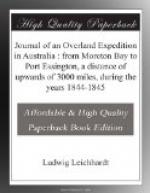Nov. 10.—The country along the river changed, during the last two stages, considerably for the worse. The scrub approached very near to the banks of the river, and, where it receded, a disagreeable thicket of Bastard-box saplings filled almost the whole valley: fine lagoons were along the river, frequently far above its level; the river itself divided into anabranches, which, with the shallow watercourses of occasional floods from the hills, made the whole valley a maze of channels, from which we could only with difficulty extricate ourselves. “I never saw such a rum river, in my life,” said my blackfellow Charley.
The open forest was sometimes one large field of everlasting flowers with bright yellow blossoms; whilst the scrub plains were thickly covered with grasses and vervain. Almost all the grasses of Liverpool Plains grow here. Ironstone and quartz pebbles were strewed over the ground; and, in the valley, fine-grained sandstone with layers of iron-ore cropped out.
Large fish were seen in the lagoons; but we only succeeded in catching some small fish of the genus Gristes. Muscles continued to be frequent; and we saw the gunyas of the natives everywhere, although no native made his appearance.
It was here that I first met, growing on the scrubby hills, a species of Bauhinia, either shrubby or a small shady tree, with spreading branches; the pods are flat, of a blunt form, almost one inch in breadth, and from three to four inches long. The Bricklow seems to prevent the growth of almost all other vegetation, with the exception of a small shrub, with linear lanceolate aromatic leaves. An Acacia, with long drooping, almost terete leaves, grew along the river; and Crinums grew in patches amongst the everlasting flowers, on a sandy soil. Our latitude, of the 9th November, was 25 degrees 53 minutes 55 seconds; and that of the 10th, 25 degrees 47 minutes 55 seconds, at about eleven miles north-west from the camp of the 8th November.
Until the 14th of November, we travelled down the Dawson. In order to avoid the winding course of the river, and the scrub and thickets that covered its valley, which rendered our progress very slow, we had generally to keep to the ridges, which were more open. We several times met with fine plains, which I called “Vervain Plains,” as that plant grew abundantly on them. They were surrounded with scrub, frequently sprinkled with Bricklow groves, interspersed with the rich green of the Bauhinia, and the strange forms of the Bottle-tree; which imparted to the scene a very picturesque character. From one of these plains we obtained, for the first time, a view of some well-defined ranges to the west-north-west. The general course of the river, between the latitudes of 25 degrees 41 minutes 55 seconds and 25 degrees 37 minutes 12 seconds, was to the northward; but, as it commenced to turn to the east, I was induced to cross it, and to follow my former direction to




